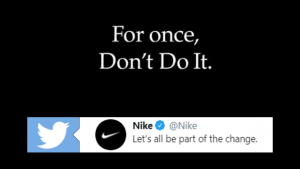
In a rare move, major companies in the United States are now taking a stand on racial injustice and police violence. According to the New York Times, multiple brands have incorporated “#BlackLivesMatter” into their social media accounts.
The NYT reports that protestors against George Floyd’s killing have received backing, unexpectedly, from usually reserved, corporate America. The daily reads that American advertisers are normally conservative about speaking about political issues, and avoid news stories such as, for example, the coronavirus pandemic. However, following Floyd’s death at the hands of law enforcement last Monday in Minneapolis, a broad range of companies have begun to take a public stand against racial injustice and police violence.
On Saturday, Netflix posted on Twitter “To be silent is to be complicit. Black lives matter. We have a platform, and we have a duty to our Black members, employees, creators and talent to speak up.”
Twitter, meanwhile, changed its profile image on the platform to black and added “#BlackLivesMatter” to its description.
This begs the question: Is it all marketing? Americus Reed, a marketing professor at the Wharton School at the University of Pennsylvania, said, “It’s smart — they’re taking a stand, hopefully, because it’s moral, but also because they understand the long-term economic game.”
Mark Mason, the chief financial officer of Citigroup, wrote a blog post on the company’s website that echoed Mr. Floyd’s pleas to the white officer kneeling on his neck: “I can’t breathe.”
Reebok said in a message to its social media followers: “We are not asking you to buy our shoes. We are asking you to walk in someone else’s.”
Nike released a new ad on Friday that said, “For once, don’t do it,” imploring people to stop pretending “there’s not a problem in America.”
Those mentioned are just a few. There are plenty more in the US corporate world who have joined, in various degrees, the chorus in the #BlackLivesMatter movement. Certainly, more than has had a precedent.
However, some feel, without having been offered funding or other resources, corporate empathy was not enough. An influencer, Jackie Aina, who has more than three million subscribers on YouTube, said that while she did not expect all companies to weigh in, brands that borrow heavily from black culture and target black consumers have a responsibility to push for change, by bringing more black employees into their ranks.
Umm Muhammed Umar







0 Comments